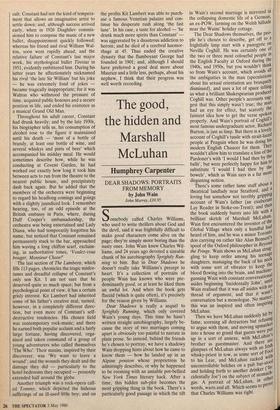The good, the hidden and Marshall McLuhan
Humphrey Carpenter
DEAR SHADOWS: PORTRAITS FROM MEMORY by John Wain
John Murray, .f10.95
Somebody called Charles Williams, who used to write thrillers about God and the devil, said it was frightfully difficult to make good characters come alive on the page; they're simply more boring than the nasty ones. John Wain knew Charles Wil- liams, and 24 years ago devoted a sizeable chunk of his autobiography Sprightly Run- ning to him. But in Dear Shadows he doesn't really take Williams's precept to heart. It's a collection of portraits of people Wain has known who were pre- dominantly good, or at least he liked them an awful lot. And when the book gets flaccid (which is quite often), it's precisely for the reason given by Williams.
Dear Shadows is really a sequel to Sprightly Running, which only covered Wain's young days. This time he hasn't written straight autobiography, largely be- cause the story of two marriages coming apart is obviously too painful to narrate in plain prose. So instead, behind the friends he's chosen to portray, we have a shadowy Wain dropping hints about how he came to know them — how he landed up in an Alpine pension whose proprietress he admiringly describes, or why he happened to be rooming with an amiable pot-bellied New York Times literary hack. After a time, this hidden sub-plot becomes the most gripping thing in the book. There's a particularly good passage in which the rift
in Wain's second marriage is mirrored in the collapsing domestic life of a German, an ex-POW, farming on the Welsh hillside near the Wains' holiday cottage.
The Dear Shadows themselves, the peo- ple he's chosen to describe, get off to a frightfully limp start with a panegyric on Neville Coghill. He was certainly one of the two or three most colourful people in the English Faculty at Oxford during the 1940s, and 1950s, but you wouldn't think so from Wain's account, which avoids all the ambiguities in the man (speculations about his sexual orientation are brusquely dismissed), and uses a lot of space telling us what a brilliant Shakespearian producer Coghill was. Other people's accounts sug- gest that this simply wasn't true; the man had an eye for effect, but scarcely the faintest idea how to get the verse spoken properly. And Wain's portrait of Coghill's most famous undergraduate actor, Richard Burton, is just as limp. But there is a lovelY account of Coghill's tussle with strait-laced people at Penguin when he was doing his modern English Chaucer for them. They wouldn't allow him to translate a line of the Pardoner's with 'I would I had thee by the balls', but were perfectly happy for him to substitute 'I would I had thee by the bowels', which as Wain says is a far mote disgusting notion. There's some rather lame stuff about a theatrical landlady near Stratford, and 3 loving but somehow not terribly griPPing account of Wain's father (an exuberant Lay Reader in Stoke-on-Trent); and then the book suddenly bursts into life with 3 brilliant sketch of Marshall McLuhau. Wain first encountered the inventor of the Global Village when only a handful had heard of him, and he was a minor Toronto don carrying on rather like Alan Bennett 's spoof of the Oxford philosopher in Beyond the Fringe. Wain shows us McLuhan strug- gling to keep order among his teenage daughters, massaging the back of his neck with some sort of vibrator to keep the blood flowing into the brain, and machine: gunning Wain with constant conversational asides beginning 'Incidentally John', until Wain realised that it was all asides with IT thread of argument, and that it wasn t conversation but a monologue. No matter; this was an inspired and often inspiring McLuhan. Then we have McLuhan suddenly hit bY fame, scorning all detractors but refusingt to argue with them, and moving uptake,. into a house so grand that guests were pu,, up in a sort of annexe, with McLuham s brother as guestmaster. And there are glimpses of McLuhan always with an Iris", whisky-priest in tow, as some sort of Fool to his Lear, and McLuhan racked Wit", uncontrollable belches on a pub bar-stool and holding forth to another drinker ('1tt: cidentally Joe') on the subject of stomach,. gas. A portrait of McLuhan, in other words, warts and all. Which seems to pros'_ that Charles Williams was right.


















































 Previous page
Previous page